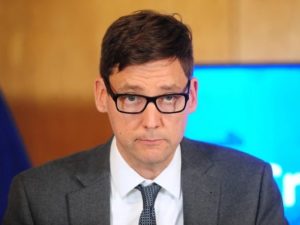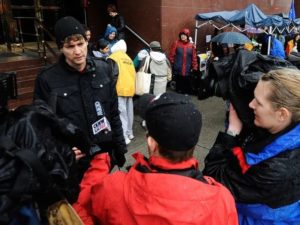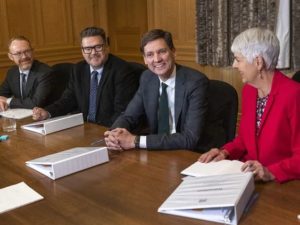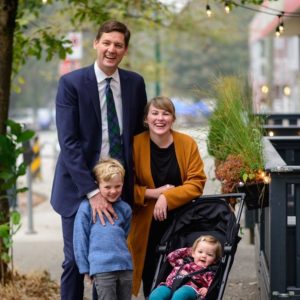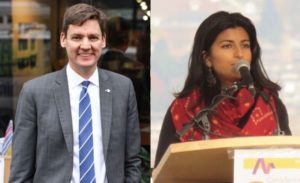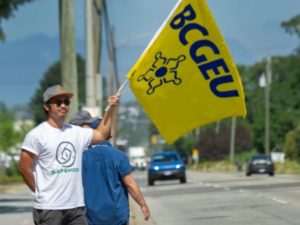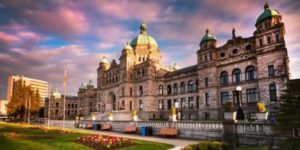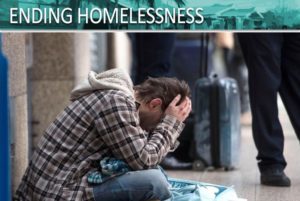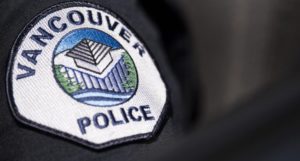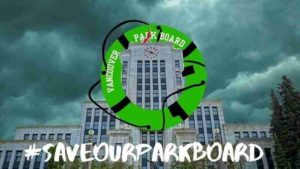
On Wednesday, December 13th, the eight members of the elected majority on the ABC Vancouver City Council — led by Mayor Ken Sim — voted unanimously to a eliminate an elected Vancouver Park Board, the most successful elected Park Board on the continent which, dating back to its creation in 1889, has overseen the growth of a parks system in the City of Vancouver that is the envy of the world.
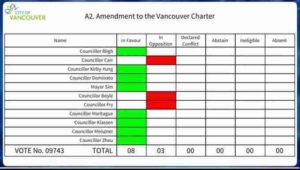
Tonight’s #ParkBoard decision from Mayor Sim & ABC is so disrespectful and undemocratic.
They didn’t run on this promise, they haven’t tried to improve things. And now they’re ramming forward to eliminate a democratically elected body mid-way through their term. 1/4 ? pic.twitter.com/57TkP6oVtE
— Christine Boyle (@christineeboyle) December 14, 2023
In the coming days weeks, months and years, VanRamblings will explore why this electoral abomination occurred, what this wrong-headed decision means electorally for the elected Councillors who comprise the “super majority” ABC Vancouver holds at City Council, and what impact the decision of Council has had and will have on the provincial government led by Premier David Eby — whose government is compelled to review and entertain the motion passed by Vancouver City Council requesting that the government enact the necessary change to the Vancouver Charter that would abolish the elected Park Board.
As Vancouver City Councillor Christine Boyle states in her tweet above, ABC Vancouver did not run on a promise to eliminate the elected Vancouver Park Board. From a July 28, 2022 article written by CBC civic affairs reporter Justin McElroy …
The Vancouver mayoral candidate who promised to get rid of the city’s independent park board is now saying he’d like to keep it.
“Vancouverites deserve well run parks now. We can’t wait three to four years to make an administrative change,” said A Better City (ABC) mayoral candidate Ken Sim, who announced his party’s park board candidates and platform Thursday morning.
The candidates are Brennan Bastyovanszky, Laura Christensen, Angela Haer, Scott Jensen, Marie-Claire Howard and Jas Virdi.
They will be running on a platform of repairing aging infrastructure, doing a financial audit of the park board, improving the Stanley Park bike lane, and making permanent the pilot allowing drinking in parks, expanding it to all major parks and starting a separate pilot for drinking at beaches.
A Done Deal | Council Votes to Eliminate Elected Vancouver Park Board
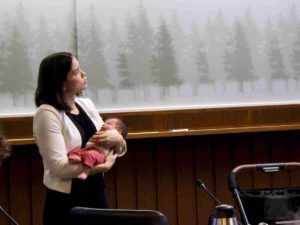
Vancouver Park Board Commissioner at Vancouver City Hall, holding her new, month old baby
A statement from Laura Christensen, Vancouver Park Board Commissioner …
It was difficult to distill my thoughts on this into a 3-minute speech. Incredibly disappointed in the mayor and ABC councillors for turning their back on their campaign promises and completely ignoring the electorate in this decision. https://t.co/W0we9exUHT
— Laura Christensen (@l_christe) December 17, 2023
Click on this link to hear duly elected (now former) ABC Vancouver Park Board Commissioner Laura Christensen address the whole of Vancouver City Council on December 13, 2023 — including her ABC Council running mates — on the initiative of the political party she ran with to eliminate the elected Vancouver Park Board.
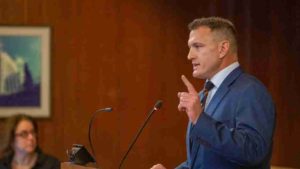
Brennan Bastyovanszky, elected chair of the Vancouver Park Board, urged Mayor Ken Sim and Councillors, Wednesday, December 13, 2023 not to begin the process to abolish the elected Park Board
In point of fact, 82 members of the Vancouver public — including more than 20 past, elected Park Board Commissioners, as well as dozens of citizens who have appeared before the Vancouver Park Board to argue their case in respect of Vancouver’s parks and recreation centres — spoke passionately to the members of Vancouver City Council, to protect “the last bastion of civic democracy in the Metro Vancouver region, and a cherished institution that has made Vancouver not only the parks capital of North America, but the envy of the world, across our globe.”
Next week, VanRamblings will set about to refute the notion espoused by Mayor Ken Sim that the Vancouver Park Board is “broken” or the — forgive us for saying so, the ludicrous, and utterly unsupportable — notion that there are “millions in savings” to be had by eliminating the elected Vancouver Park Board, by turning over the responsibility of governance to an already over-extended and far-too-busy-by-half Vancouver City Council, wherein VanRamblings will refute the (unintended) disinformation contained in Emily Lazatin’s Global BC news report on the proposal by Vancouver City Council to abolish Vancouver’s elected Park Board.
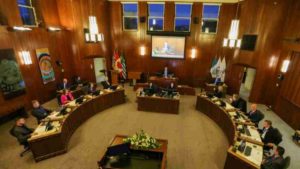
Make no mistake, no matter what the speakers had to say who presented to Vancouver City Council on preserving an elected Vancouver Park Board, no matter how reasoned their arguments, no matter how articulate and passionate their presentation, ABC Vancouver Councillors had made their minds up well in advance of hearing speakers in Council chambers, arising from an imposed caucus “solidarity” issued by the Mayor’s office directing ABC Councillors to eliminate the elected Park Board — note should be made that ABC Councillors were not even informed of the change of direction in respect of the elected Park Board by Mayor Ken Sim prior to his announcement in the press to abolish the elected Park Board — it was a “done deal”, no matter the information presented to ABC Vancouver Councillors.
The difference between the Vancouver Park Board and Vancouver City Council?
At the Vancouver Park Board table, members of the public can change the mind of Park Board Commissioners, and affect the direction and priorities of Park Board — on Wednesday, VanRamblings will present two cogent examples of the public effecting a meaningful policy change at Park Board — whereas at Vancouver City Hall, more often than not, the minds of Councillors have been made up long in advance of hearing from the public. Autocracy reigns at Vancouver City Hall.
Democracy, on the other hand, reigns long at the Vancouver Park Board table.
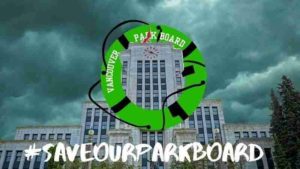 Click / tap on the graphic above to sign the Save Our Park Board Petition started by Sarah Blyth
Click / tap on the graphic above to sign the Save Our Park Board Petition started by Sarah Blyth

Click / tap on the graphic above to donate to the Save Our Park Board GoFundMe display campaign

